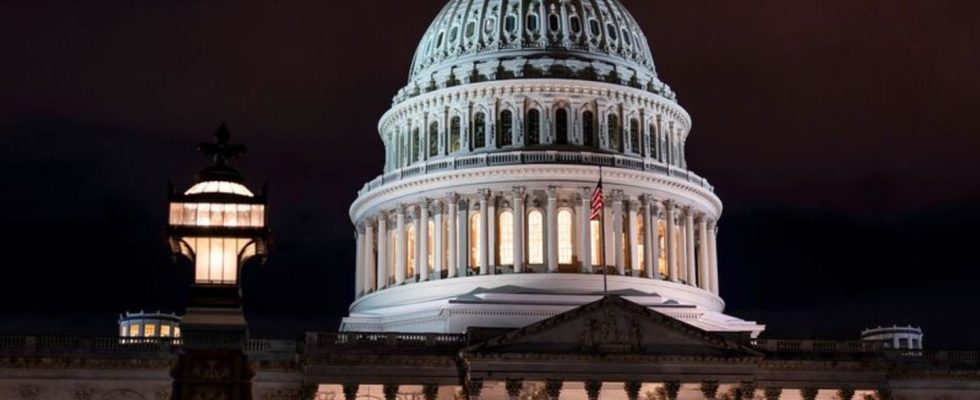Government
At the last moment: US Senate passes budget package
The US Capitol in Washington: A shutdown was averted in the USA. photo
© J. Scott Applewhite/AP/dpa
The clock on the US East Coast strikes midnight. It would be the moment when the partial shutdown begins – there is an agreement at the last minute. A Republican in Congress has his own concerns.
The US Senate passed a trillion-dollar budget package at the last moment. Voting began late Friday evening just before the deadline a minute past midnight and ended early in the morning. Until recently, it was unclear whether there would be a partial standstill in government business – a so-called shutdown.
Theoretically, this was also the case for a short time, as the deadline passed before the Voting was over. However, this did not have an actual effect. US President Joe Biden still has to sign the law – this is considered a formality. The White House announced that night that it expected this to happen.
The budget package was approved by the House of Representatives with a cross-party majority on Friday afternoon. The fact that a vote in the Senate was only just a short time ago was not due to a lack of a majority, but rather due to parliamentary tactics by Republican senators. In the end, a total of 74 senators voted for the budget package and 24 against it.
The impact of a shutdown would initially have been minimal over the weekend, as most of the government employees affected are off work anyway. It would have become problematic if the discussions had dragged on further into the coming week. A shutdown means millions of government employees will no longer receive a salary. Many ministries and authorities have contingency plans for this scenario. The extent to which a shutdown affects everyday life and the economy in the USA ultimately depends on its length.
Two-part household
The now passed 1.2 trillion US dollar (around 1.1 trillion euros) budget package finances a large part of the US government’s business for the current fiscal year, which runs until the end of September. It contains, among other things, funds for defense, the Department of Homeland Security and the Ministry of Labor – but it does not include new financial aid from the USA for other countries such as Ukraine. A corresponding legislative package is currently stuck in the House of Representatives.
Republicans and Democrats agreed on the budget package at the beginning of the week after an initial, smaller budget package had already been passed. As a rule, Congress agrees on a large overall package to finance government operations. It should actually have been passed last fall. Recently, however, the Republicans have resisted this. They split up the household. The second part was still pending. Together, both packages now amount to $1.66 trillion.
Republican caucus splinters
The arguments over the budget had been going on for months. In the meantime, Congress managed to pass several interim budgets. This essentially had to do with a blockade attitude among the Republicans. The votes in the House of Representatives necessary for the second budget package were achieved with Republican support. However, a majority of the group still voted against it. Among other things, the MPs had called for major cuts in the budget.
The vote in his chamber could have consequences for the Republican chairman of the House of Representatives, Mike Johnson. MP Marjorie Taylor Greene from the ultra-right fringe surprisingly introduced a motion to drive her party colleague out of office. According to Greene, this was initially just a “warning”. In her view, the budget package is a Democratic budget that she does not support. At the same time, she also explained: “We need a new chairman.”
Delicate situation for Johnson
It is true that some intermediate parliamentary steps are necessary between Greene’s motion and an actual vote of no confidence. At this point it is unclear whether – and if so, when – this could happen. The move once again highlights Johnson’s politically sensitive situation. Since his election as chairman in October last year, members of the radical right have been pushing him. His predecessor, Kevin McCarthy, had previously fallen out over the funding issue himself.
Johnson is having a hard time closing his own ranks – even though he has only a wafer-thin majority that will soon shrink even further: Republican Mike Gallagher also announced his resignation on April 19th. The Wisconsin state representative’s seat will remain empty until the November election.
For Johnson, this means, on the one hand, that he is even more dependent than before on Democratic votes for any legislative proposals. On the other hand, he can’t really afford compromises because this turns the right-wing hardliners against him.
Even in the event of a vote of no confidence, Johnson would need votes from the Democrats. According to the US media, they have already signaled that they want to come to his aid – if he brings the Ukraine aid that has been stuck in his chamber for weeks to a vote. This in turn is a red flag for the radical right and would be a daring step on Johnson’s party-political balancing act.

